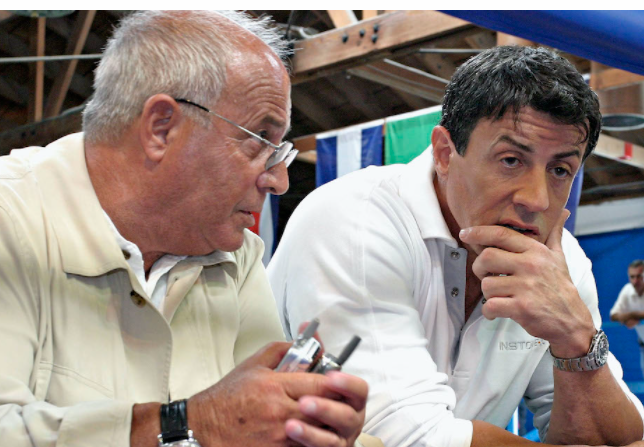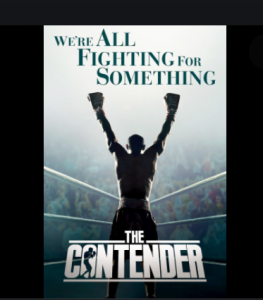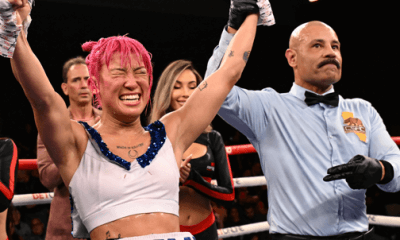Featured Articles
The Hauser Report: Jeff Wald and Other Notes

The holiday season is a time to tie up loose ends from earlier in the year. With that in mind, I’d be remiss if I didn’t acknowledge the passing of Jeff Wald who died on November 12 at age 77.
Wald was a show business manager, then a producer, and later in life, a boxing promoter. The Hollywood Reporter described him as “short, barrel-chested with a gravelly Bronx-accented voice, hot-tempered and prone to fisticuffs.”
How hot-tempered?
“In 1980,” The Hollywood Reporter recounted, “Wald was arrested after brandishing a shotgun in front of picketing hotel employees in Tahoe. Wald acknowledges that he thrust the gun into a picketer’s mouth. He got 18 months probation and paid a $1,000 fine.”
Julia Phillips, in her best-selling memoir You’ll Never Eat Lunch in This Town Again, wrote, “Wald is always ripping someone a new asshole or tearing off someone’s head to sh** in his neck.”
Over the years, Wald attracted numerous high-profile clients. Sylvester Stallone, Roseanne Barr, Elliott Gould, Marvin Gaye, Donna Summer, Miles Davis, and David Crosby were on his list. He also managed Helen Reddy, which is a story unto itself.
Wald married Reddy in 1966. Four years later, he secured a recording contract for her with Capitol Records. That led to fourteen top-ten hits and four #1 singles, foremost among them the iconic song, I Am Woman.
I Am Woman, which Reddy wrote with Ray Burton and sang solo, became a worldwide feminist anthem. Her marriage to Wald ended in 1983 when he was in the throes of a serious cocaine addiction.
“There have been many moments of blinding truth in my life,” Reddy wrote in a 2006 memoir. “One was during the dying days of my marriage. Despite all the denials, it was obvious to me that my husband still had a cocaine problem. He had been treated before for his addiction, but his behavior indicated that he was still using – as did his pillow which, by morning, had blood spots, bone fragments, and gristle from his nose embedded in it.”
After overdosing in 1986, Wald underwent treatment at the Betty Ford Center in California and was clean for the rest of his life.
What does all of this have to do with boxing?
Wald was a huge boxing fan. In 1997, he and Irving Azoff partnered to promote the final two fights of George Foreman’s ring career. More significantly, Wald was the driving force behind The Contender – the “reality-TV” boxing series that he created with Mark Burnett, Jeffrey Katzenberg and Sylvester Stallone.

That’s where my life intersected with Wald’s.
In 2004 and 2005, I wrote a series of articles about The Contender. The articles began on an optimistic note. But their tone changed as The Contender moved away from what makes boxing great and – with the suicide of boxer Najai Turpin – into scandal.
Wald was displeased with the articles. To put it mildly. At one point, he tried to throw me out of a Contender press conference only to be overruled by Sugar Ray Leonard. Not long after that, I was chatting with attorney Pat English at a fight in Las Vegas when Wald approached, stood in front of me, and bellowed, “I want to tell something. Everyone knows that you and Lou DiBella f*** each other up the ass in hotel rooms.”
I assume that Wald was also at odds with DiBella at the time.
And that’s how things stood between us until, one afternoon, the telephone rang. To my surprise, it was Wald.
I’d written a series of articles about the decline of HBO’s boxing franchise, identifying what I understood the problems to be and suggesting how they might be fixed.
“I’ve been reading your articles about HBO,” Wald told me. “You’re right about everything you’re saying.”
We talked for a while about HBO and boxing in general. Then . . .
“You know,” Wald said. “The reason I was so mad at you for what you wrote about The Contender is that a lot of what you wrote was true. I didn’t like it, but it was true.”
In later years, Wald and I talked on the phone from time to time. Most of our conversations centered on boxing. Jeff understood the sport and business well. On occasion, the conversations were personal.
Once, we were talking about Helen Reddy, and I asked Jeff if he took pleasure in knowing that he’d played a crucial role in making I Am Woman a cultural touchstone in the women’s rights movement.
“I suppose so,” he answered. “But to tell you the truth, Helen was bat-sh** crazy.”
“She must have been,” I countered. “She married you.”
“Fair enough,” Wald said.
The boxing community is incredibly diverse with a wide range of people in it. Jeff Wald was part of that community. He loved boxing. He navigated his way through the business end of the sweet science for years. He was a boxing guy and proud of it.
* * *
I’ve been critical of Triller in recent articles on this website. But let’s give credit where credit is due.
On December 2, Triller, promoted a five-bout card at the Hammerstein Ballroom in New York in conjunction with DiBella Entertainment. In the first four fights of the evening, four favorites (three of them undefeated) lost. And in the fifth fight, Mike Hunter should have lost too.
Hunter came into the bout with a 20-1-1 (14 KOs) record. He was ranked second by the WBA, sixth by the WBO, and seventh by the WBC. His opponent, Jerry Forrest (26-4-1, 20 KOs), is a journeyman who has now won once in his last five fights. That victory came against 3-25-1 Martez Williamson.
But Forrest came ready to fight and Hunter didn’t. Hunter looked sloppy and out-of-shape. His timing was off. And to paraphrase – he fought like he wanted it less. The judges scored the bout a split-decision draw. That was a disservice to Forrest.
I can’t think of another instance where I went to the fights and not a single favorite won. Kudos to Triller, Lou DiBella, and matchmaker Eric Bottjer on this one.
* * *
And another loose end.
Floyd Mayweather ventured into the vaccination culture war earlier this year when he tweeted his support for Kyrie Irving, who has been temporarily barred from playing for the Brooklyn Nets as a consequence of his refusal to be vaccinated.
Speaking directly to Irving, Floyd said, “America gave us the choice to take the vaccine or not take the vaccine. As time moves on, that choice is gradually being stripped from us. It’s crazy how people hate you for being a leader. I hope your actions encourage many others to stand up and say enough is enough. Respect to you Kyrie, and power to the people.”
But let’s not forget; Irving is the same “leader” who, in 2017, proclaimed that the Earth is flat and declared, “When I started actually doing research on my own and figuring out that there is no real picture of Earth, not one real picture of Earth – and we haven’t been back to the moon since 1961 or 1969 – it becomes like conspiracy, too. The Earth is flat. I’m telling you, it’s right in front of our faces. They lie to us.”
That bit of genius prompted NBA commissioner Adam Silver to observe, “Kyrie and I went to the same college [Duke]. He may have taken some different courses.”
Thomas Hauser’s email address is thomashauserwriter@gmail.com. His most recent book – Broken Dreams: Another Year Inside Boxing – was published by the University of Arkansas Press. In 2004, the Boxing Writers Association of America honored Hauser with the Nat Fleischer Award for career excellence in boxing journalism. In 2019, he was selected for boxing’s highest honor – induction into the International Boxing Hall of Fame.
Check out more boxing news on video at the Boxing Channel
To comment on this story in the Fight Forum CLICK HERE
-

 Featured Articles4 weeks ago
Featured Articles4 weeks agoThe Hauser Report: Zayas-Garcia, Pacquiao, Usyk, and the NYSAC
-

 Featured Articles3 weeks ago
Featured Articles3 weeks agoOscar Duarte and Regis Prograis Prevail on an Action-Packed Fight Card in Chicago
-

 Featured Articles2 weeks ago
Featured Articles2 weeks agoThe Hauser Report: Cinematic and Literary Notes
-

 Book Review2 weeks ago
Book Review2 weeks agoMark Kriegel’s New Book About Mike Tyson is a Must-Read
-

 Featured Articles4 weeks ago
Featured Articles4 weeks agoRemembering Dwight Muhammad Qawi (1953-2025) and his Triumphant Return to Prison
-

 Featured Articles7 days ago
Featured Articles7 days agoMoses Itauma Continues his Rapid Rise; Steamrolls Dillian Whyte in Riyadh
-

 Featured Articles3 weeks ago
Featured Articles3 weeks agoRahaman Ali (1943-2025)
-

 Featured Articles3 weeks ago
Featured Articles3 weeks agoTop Rank Boxing is in Limbo, but that Hasn’t Benched Robert Garcia’s Up-and-Comers


















